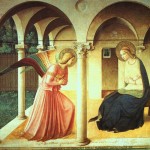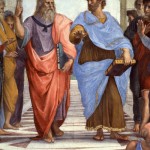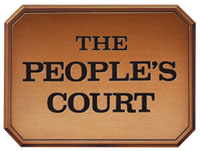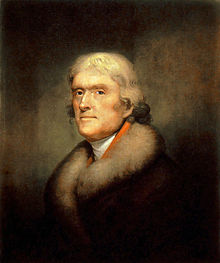Scene 3: On a Mission
It wasn’t just my bad experiences that soured me on church. The whole premise of Christianity was starting to bother me, especially in the way it was portrayed by its most vocal practitioners.
On one side were fundamentalists like Jerry Falwell and Pat Robertson, preaching an amalgamation of legalistic theology and free-market capitalism. On the other side were groups like the Jesus Seminar, scholars who spent their time debating which of the words of Jesus were actually spoken by Jesus. Then there was Bishop John Shelby Spong, who advocated something he called non-theistic Christianity.
If I could point to one thing that bothered me about all these versions of Christianity, it was that they all seemed to agree that the most important element of the Christian faith was to talk about Christianity. I had a need for a faith that was more than just talk.
I remembered reading in the gospels how Jesus fed the hungry, healed the sick, lifted up the lowly and humbled the proud, and I wanted to find Christians who lived like that. Due to my previous experiences I doubted I would ever find that type of faith community. But in the spring of 1994, the thought entered my head that I should join a church and go serve in a foreign country. At first I dismissed it as unrealistic, but the more I tried to ignore it the more persistent the thought became.
So I made myself start visiting churches again. This time I limited myself to mainline denominations, in the hope of avoiding the authoritarian traps I had previously fallen into.
In August I visited East Heights United Methodist Church. One of the things I would grow to love about East Heights was that every week before taking the offering, they highlighted one of their ministries that the offering helps fund. The first week I visited the ministry focus was the annual February mission trip to Costa Rica. The pastor added that there was still time to sign up for the trip. I knew instantly that this was the church I was looking for.
The only problem was the cost. United Methodist missionaries are expected to pay their own way, and I would need $800 to cover my expenses. My night job covered my rent and bills, but I didn’t know if I could spare $800. So I told God, with less humility than the situation probably called for, that if he would provide the funds I would go.
That night my boss called me into his office and said that he appreciated my work, and he gave me a 75 cent per hour raise. I mentally calculated 75 cents times 40 hours times the 27 weeks remaining until the trip: $810. Despite the fact that my take-home pay would be less than that after taxes, I managed to save enough for the trip.
When February came I went with the team to Ciudad Quesada, Costa Rica, to help build an additional wing to a rural hospital. The locals, despite their poverty, displayed a strong faith and a trust that God would take care of them through hardships. Back in the U.S., a lot of people I knew worried constantly about whether their paychecks would cover their credit card bills.
In Costa Rica I saw the type of faith community that I wanted Christianity to be. I flirted with the idea of dropping everything and moving to Central America, but in the end I didn’t have the nerve.
I would later make two more short-term mission trips to Latin America. I’d like to believe that I did some good, but the truth is that I got far more out of the experiences than I could ever have given.
Scene 4: Faith in Crisis
On my return home from Costa Rica I was still uncomfortable with most of what I saw in American Christianity, but at East Heights I at least found a refuge from the extremes.
But about that time, my faith took a hit from a completely different direction. The recently repaired Hubble Space Telescope was producing incredibly detailed photos of the far reaches of the galaxy. At the same time, astronomers discovered the first clear evidence of planets outside our solar system. It was an exciting time for astronomy, and my old love of the night sky led me to seek as much information as I could about the origins of the universe. I saw how the Big Bang made more sense than any other explanation.
And that wasn’t all. New fossil discoveries in Africa, combined with the human genome project, gave scientists an ever-increasing understanding of our relation to extinct hominid species, and the more they learned the muddier the picture became. For the first time, I grasped the role of evolution in how we got to where we are.
This new knowledge appealed to the rational side of me, but I couldn’t see a way to reconcile it with the spiritual side of me. The more I learned about scientific discoveries and the scientific process, the more uncomfortable I felt professing a faith rooted in miracles–even though I’d experienced miracles in my own life.
I mentioned these struggles in a BBS forum where I was active, and received a reply from someone by the handle of Shaolin, who opined that this was a weakness of Western religion. He suggested I look into Taoism as an alternative.
I was so confused about my faith that I was willing to give it a try. I bought a copy of the Tao Te Ching and started reading. From the very first words, this book challenged and confronted my rational side.
The Tao that can be spoken is not the eternal Tao.
The name that can be named is not the true name.
In Western society it is comforting to have an explanation for everything. Life, however, is messy and doesn’t always lend itself to answers. No matter how well we think we understand this world, some things remain beyond our grasp. This theme of not being able to grasp the ultimate is repeated throughout the Tao Te Ching.
The Taoist concept of wei-wu-wei (literally “action without action”, meaning something along the lines of going with the flow of the way things ought to be rather than trying to bend things to our desires) also struck a chord with me.
When nothing is done, nothing is left undone.
The world is ruled by letting things take their course.
It cannot be ruled by interfering.
Christian faith is like this as well. We will never accomplish God’s will by interfering and doing things our own way. Only by yielding to God can we accomplish anything. The more I read of Taoism, the more I realized it had nothing for me that I couldn’t already find in Christianity.
Look, it cannot be seen–it is beyond form.
Listen, it cannot be heard–it is beyond sound.
Grasp, it cannot be held–it is intangible.
These three are indefinable;
Therefore they are joined in one.
I never expected to see support for the Trinity in the Tao Te Ching. Granted, this passage is talking about something else. Yet the doctrine of the Trinity does indeed hold that three are joined in one, and that ultimately they are beyond our ability to define. The Tao Te Ching had given me a way of viewing the world without the need to rationalize everything. And with that in place, I was finally ready to accept Christianity on its own terms.
I still struggle with questions most people will never ask, and I still have problems with authoritarians. I’ve still got a long road ahead of me, but I trust that God knows better than I do. And at this stage of the journey, that’s all I need.
 ary
ary















